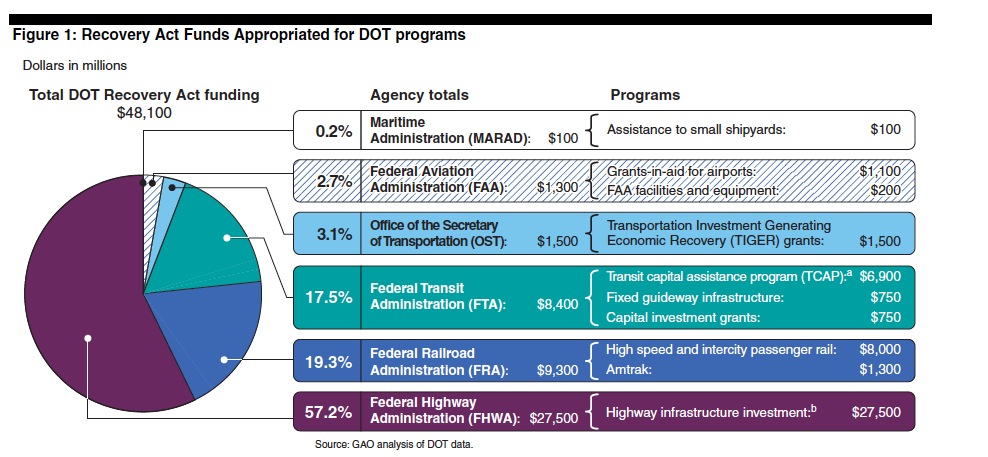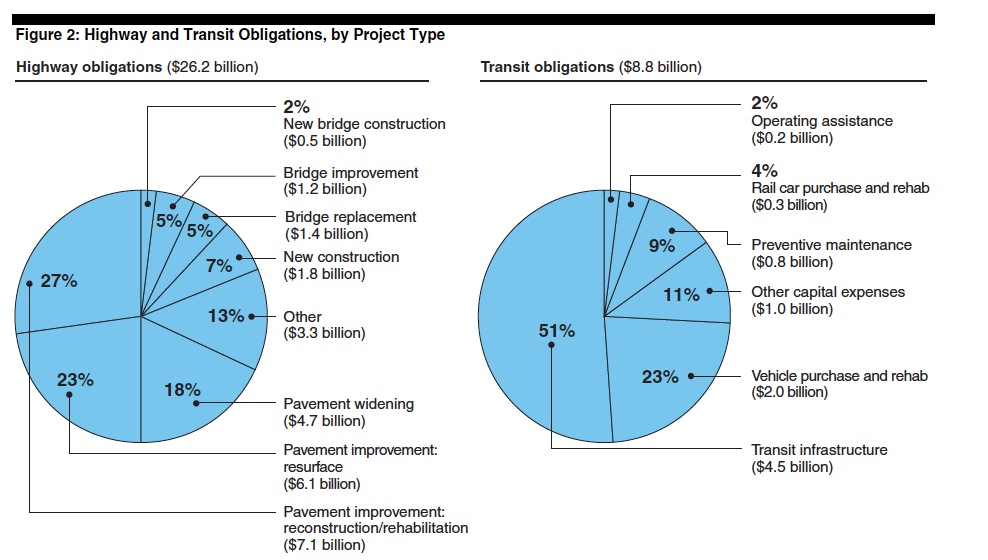UNITED STATES GOVERNMENT ACCOUNTABILITY OFFICE
What GAO Found
As of May 31, 2011, nearly $45 billion (about 95 percent) of Recovery Act transportation funds had been obligated for over 15,000 projects nationwide, and more than $28 billion had been expended. Recipients continue to report using Recovery Act funds to improve the nation’s transportation infrastructure. Highway funds have been primarily used for pavement improvement projects, and transit funds have been primarily used to upgrade transit facilities and purchase buses. Recovery Act funds have also been used to rehabilitate airport runways and improve Amtrak’s infrastructure. The Recovery Act helped fund transportation jobs, but long-term benefits are unclear. For example, according to recipient reported data, transportation projects supported between approximately 31,460 and 65,110 full-time equivalents (FTE) quarterly from October 2009 through March 2011. Officials reported other benefits, including improved coordination among federal, state, and local officials. However, the impact of Recovery Act investments in transportation is unknown, and GAO has recommended that DOT determine the data needed to assess the impact of these investments.
Federal, state, and local oversight entities continue their efforts to ensure the appropriate use of Recovery Act transportation funds, and recent reviews revealed no major concerns. The DOT Inspector General found that DOT generally complied with Recovery Act aviation, highway, and rail program requirements. Similarly, state and local oversight entities’ performance reviews and audits generally did not find problems with the use of Recovery Act transportation funds.
GAO’s analysis of Recovery.gov data reported by transportation grant recipients showed that the number of FTEs reported, number of recipients filing reports, and portion of recipients reporting any FTEs decreased over the past two reporting quarters as an increasing number of projects approached completion or were awaiting financial closeout. The Federal Highway Administration performs automated checks to help ensure the validity of recipient reported data and observed fewer data quality issues than in previous quarters but does not plan to use the data internally.
Certain Recovery Act provisions proved challenging. For example, DOT and states faced numerous challenges in implementing the maintenance-of-effort requirement, which required states to maintain their planned level of spending or be ineligible to participate in the August 2011 redistribution of obligation authority under the Federal-Aid Highway Program. In January 2011, DOT reported that 29 states met the requirement while 21 states did not because of reductions in dedicated revenues for transportation, among other reasons. The economically distressed area provision also proved difficult to implement because of changing economic conditions. With regard to the high speed intercity passenger rail and Transportation Investment Generating Economic Recovery (TIGER) grant programs, GAO found that while DOT generally followed recommended grant-making practices, DOT could have better documented its award decisions.
About the United States Government Accountability Office
www.gao.gov
“The U.S. Government Accountability Office (GAO) is an independent, nonpartisan agency that works for Congress. Often called the “congressional watchdog,” GAO investigates how the federal government spends taxpayer dollars. The head of GAO, the Comptroller General of the United States, is appointed to a 15-year term by the President from a slate of candidates Congress proposes. Gene L. Dodaro became Acting Comptroller General of the United States on March 13, 2008, succeeding David M. Walker, who appointed him upon resigning. Gene L. Dodaro became Comptroller General of the United States and head of the U.S. Government Accountability Office (GAO) on December 22, 2010, when he was confirmed by the United States Senate. He was nominated by President Obama in September of 2010 and had been serving as Acting Comptroller General since March of 2008.”








 RSS Feed
RSS Feed